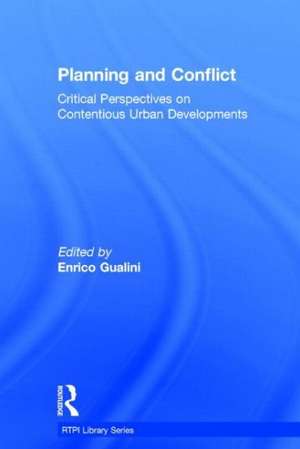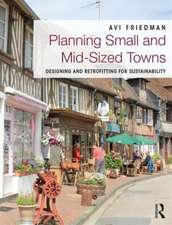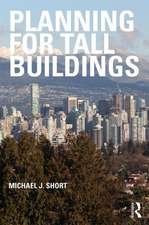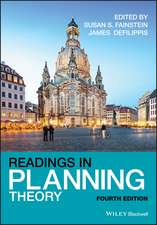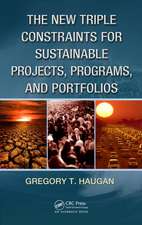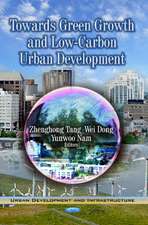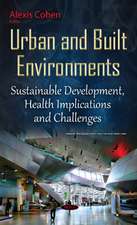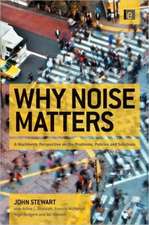Planning and Conflict: Critical Perspectives on Contentious Urban Developments: RTPI Library Series
Editat de Enrico Gualinien Limba Engleză Hardback – 13 feb 2015
By reviewing different perspectives for planners to engage with conflicts, and not simply mediate or avoid them, Planning and Conflict provides a theoretically informed look forward to the future of engaged, responsive city development that involves all its stakeholders.
| Toate formatele și edițiile | Preț | Express |
|---|---|---|
| Paperback (1) | 462.69 lei 43-57 zile | |
| Taylor & Francis – 9 feb 2015 | 462.69 lei 43-57 zile | |
| Hardback (1) | 1333.80 lei 43-57 zile | |
| Taylor & Francis – 13 feb 2015 | 1333.80 lei 43-57 zile |
Din seria RTPI Library Series
-
 Preț: 280.47 lei
Preț: 280.47 lei -
 Preț: 311.33 lei
Preț: 311.33 lei -
 Preț: 304.33 lei
Preț: 304.33 lei - 15%
 Preț: 536.24 lei
Preț: 536.24 lei -
 Preț: 282.50 lei
Preț: 282.50 lei -
 Preț: 414.32 lei
Preț: 414.32 lei - 26%
 Preț: 427.41 lei
Preț: 427.41 lei -
 Preț: 356.49 lei
Preț: 356.49 lei -
 Preț: 410.50 lei
Preț: 410.50 lei -
 Preț: 345.60 lei
Preț: 345.60 lei - 15%
 Preț: 497.45 lei
Preț: 497.45 lei -
 Preț: 450.40 lei
Preț: 450.40 lei - 15%
 Preț: 458.50 lei
Preț: 458.50 lei - 28%
 Preț: 989.02 lei
Preț: 989.02 lei - 18%
 Preț: 1275.08 lei
Preț: 1275.08 lei -
 Preț: 451.54 lei
Preț: 451.54 lei - 15%
 Preț: 557.98 lei
Preț: 557.98 lei -
 Preț: 411.04 lei
Preț: 411.04 lei -
 Preț: 487.19 lei
Preț: 487.19 lei - 15%
 Preț: 432.06 lei
Preț: 432.06 lei - 48%
 Preț: 574.28 lei
Preț: 574.28 lei - 15%
 Preț: 465.98 lei
Preț: 465.98 lei - 24%
 Preț: 330.16 lei
Preț: 330.16 lei -
 Preț: 488.33 lei
Preț: 488.33 lei -
 Preț: 497.92 lei
Preț: 497.92 lei - 18%
 Preț: 1284.97 lei
Preț: 1284.97 lei - 22%
 Preț: 329.10 lei
Preț: 329.10 lei - 15%
 Preț: 427.16 lei
Preț: 427.16 lei - 25%
 Preț: 1165.74 lei
Preț: 1165.74 lei - 15%
 Preț: 429.66 lei
Preț: 429.66 lei -
 Preț: 450.99 lei
Preț: 450.99 lei - 15%
 Preț: 443.13 lei
Preț: 443.13 lei
Preț: 1333.80 lei
Preț vechi: 1626.60 lei
-18% Nou
Puncte Express: 2001
Preț estimativ în valută:
255.26€ • 265.51$ • 210.73£
255.26€ • 265.51$ • 210.73£
Carte tipărită la comandă
Livrare economică 14-28 aprilie
Preluare comenzi: 021 569.72.76
Specificații
ISBN-13: 9780415835848
ISBN-10: 0415835844
Pagini: 334
Ilustrații: 6 black & white illustrations, 2 black & white tables
Dimensiuni: 156 x 234 x 21 mm
Greutate: 0.65 kg
Ediția:1
Editura: Taylor & Francis
Colecția Routledge
Seria RTPI Library Series
Locul publicării:Oxford, United Kingdom
ISBN-10: 0415835844
Pagini: 334
Ilustrații: 6 black & white illustrations, 2 black & white tables
Dimensiuni: 156 x 234 x 21 mm
Greutate: 0.65 kg
Ediția:1
Editura: Taylor & Francis
Colecția Routledge
Seria RTPI Library Series
Locul publicării:Oxford, United Kingdom
Public țintă
PostgraduateCuprins
Section 1: Introduction to the volume 1. Conflict in the City: Democratic, Emancipatory – and Transformative? In Search of the Political in Planning Conflicts 2. Space, Politics and Conflicts: A Review of Contemporary Debates in Urban Research and Planning Theory Section 2: Dynamics of Contention and Collective Mobilisation in Planning Conflicts 3. What Makes a Protest (Not) Happen? The Fragmented Landscape of Post-Political Conflict Culture 4. Urban Planning without Conflicts? Observations on the Nature and Conditions for Urban Contestation in the Case of Milan 5. A Muddled Landscape of Conflicts: What we can Learn about Planning/Conflict Relationships from the Story of Tor Marancia, Rome, and its Unexpected Shift Section 3: Knowledge, Power and Hegemony: Exploring the Governmentality of Planning Conflicts 6. Conflict in the Face of Planning? Power, Knowledge, and Hegemony in Planning Practice 7. Planners amidst the Storm: Planning and Politics in the Contested Metropolitan Area of Jerusalem 8. Problem Spaces, Problem Subjects: Contesting Policies in a Shrinking City 9. Mediating Stuttgart 21: The Struggle for Reconstructing Local Democracy between Agonistic and Deliberative Practices Section 4: Interpretive Policy Analysis and Deliberative Approaches to Planning Conflicts 10. Negotiation as an Interpretive Tool of Conflict Transformation in Deliberative Situations: Learning from the French ‘Public Debate’ on the Extension of the Highway La Francilienne 11. Large Infrastructures and Conflicts: Searching for ‘Boundary Objects’ – Reflections from an Italian Experience 12. Planning through Emotions: Political Lessons from the Controversy between ‘Fat Cats’ and ‘Stupid Activists’ over Re-building Brno Railway Station 13. Develop Stories, Develop Communities: Narrative Practice to Analyse and Engage in Urban Conflict Afterword
Descriere
By creating a model for planners to engage conflicts, and not simply mediate or avoid them, Planning/Conflict provides a theoretically informed look forward to the future of engaged, responsive city development that involves all its stakeholders.
